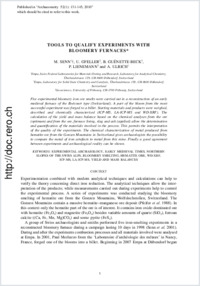Tools to qualify experiments with bloomery furnaces
DOKPE
- Senn, M. Empa, Swiss Federal Laboratories for Materials Testing and Research, Laboratory for Analytical Chemistry, Dübendorf, Switzerland
- Gfeller, U. Empa, Laboratory for Solid State Chemistry and Catalysis, Dübendorf, Switzerland
- Guénette-Beck, Barbara Geosciences, University of Fribourg, Switzerland
- Lienemann, P. Empa, Laboratory for Solid State Chemistry and Catalysis, Dübendorf, Switzerland
- Ulrich, A. Empa, Swiss Federal Laboratories for Materials Testing and Research, Laboratory for Analytical Chemistry, Dübendorf, Switzerland
-
2009
Published in:
- Archaeometry. - 2010, vol. 52, no. 1, p. 131-145
Experimental archaeology
early medieval times
northern slopes of the swiss alps
bloomery smelting
hematite ore
WD-XRF
ICP-MS
LA-ICP-MS
yield and mass balances
English
Five experimental bloomery iron ore smelts were carried out in a reconstruction of an early medieval furnace of the Boécourt type (Switzerland). A part of the bloom from the most successful experiment was forged to a billet. Starting materials and products were weighed, described and chemically characterized (ICP-MS, LA-ICP-MS and WD-XRF). The calculation of the yield and mass balance based on the chemical analyses from the ore (optimum) and from the ore, furnace lining, slag and ash (applied) allow the determination and quantification of the materials involved in the process. This permits the interpretation of the quality of the experiments. The chemical characterization of metal produced from hematite ore from the Gonzen Mountains in Switzerland gives archaeologists the possibility to compare the metal of iron artefacts to metal from this mine. Finally a good agreement between experiments and archaeological reality can be shown.
- Faculty
- Faculté des sciences et de médecine
- Department
- Département de Géosciences
- Language
-
- English
- Classification
- Archeology
- License
- License undefined
- Identifiers
-
- RERO DOC 11992
- DOI 10.1111/j.1475-4754.2009.00461.x
- Persistent URL
- https://folia.unifr.ch/unifr/documents/301151
Statistics
Document views: 148
File downloads:
- guenettebeck_tqe.pdf: 349
